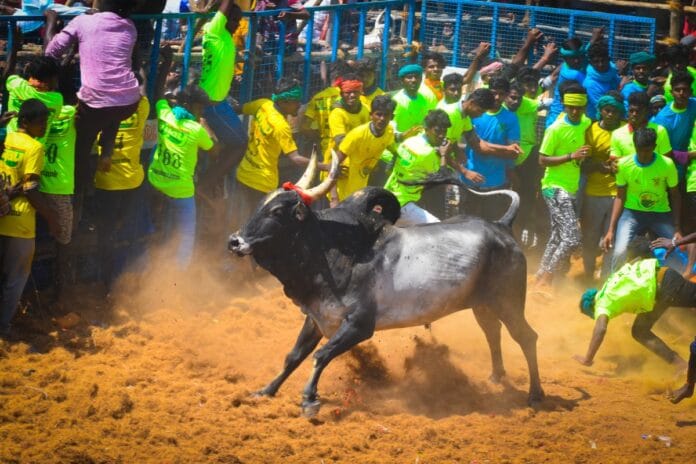Jellikettu, one of Tamil Nadu’s most iconic and controversial traditional festivals, is celebrated in several districts of the state, including Tiruchirappalli. This centuries-old event, which takes place during the Tamil month of Pongal (mid-January), has deep cultural and historical roots, although it has recently attracted national and international attention due to concerns over animal welfare.
What is Jellikettu?
Jellikettu is a bull-taming sport where participants attempt to tame a bull by holding onto its hump as it runs through an open arena. The bulls involved are specially trained, and the event is often viewed as a test of strength, courage, and skill. The participants, typically young men, chase after the bulls, trying to grab onto the animal’s hump while avoiding being tossed off or trampled.
Historical and Cultural Significance in Tiruchirappalli
The origins of Jellikettu date back over 2,000 years and are believed to be connected to ancient agricultural practices. Bulls have long been an integral part of the farming culture in Tamil Nadu, and the festival originally celebrated the bond between humans and animals, particularly the strength and vitality of bulls used for plowing fields.
In Tiruchirappalli, Jellikettu is held in various rural areas around the city, such as in Alanganallur, which is famous for its massive Jellikettu events. The festival is a part of the larger Pongal celebrations, marking the end of the harvest season. It serves as a way to honor the bulls that helped farmers during the agricultural year and to pray for good fortune in the upcoming year.
The Event and Its Rituals
On the day of Jellikettu, thousands of spectators gather in open fields or makeshift arenas, where the event is held. The bulls are let loose, and the participants, or vaadi vaasals (those who chase the bulls), attempt to hold on to the bull’s hump for as long as they can as the animal charges around the arena. The bulls are often decorated with colorful garlands and bells, adding to the festive atmosphere.
The event is accompanied by traditional music, chants, and crowds of excited onlookers. In many rural communities, Jellikettu is seen not just as a sport, but as a way to demonstrate bravery, athleticism, and a strong sense of community. It often becomes a gathering where friends, families, and villagers come together to celebrate Tamil heritage and culture.
Controversies and Animal Welfare Concerns
Despite its cultural significance, Jellikettu has been the subject of heated debates in recent years due to concerns about animal cruelty. Critics argue that the bulls are subjected to stress and violence, particularly when they are prodded, taunted, or forced into the event in ways that cause pain and distress. There have been instances of injuries to both bulls and participants, raising concerns over safety and ethics.
In response to these concerns, animal rights organizations have campaigned for the banning of Jellikettu, and in 2014, the Supreme Court of India imposed a ban on the event. However, in 2017, the Tamil Nadu government passed an ordinance allowing the festival to continue, citing its cultural importance. Regulations were introduced to ensure that the event is conducted more safely, with guidelines for the handling of bulls and penalties for violations.
Conclusion
Jellikettu is a deeply rooted cultural tradition in Tiruchirappalli and Tamil Nadu, one that reflects the region’s agricultural heritage, courage, and community spirit. However, it remains a subject of intense debate between preserving ancient traditions and addressing concerns over animal rights and welfare. The festival continues to be a prominent feature of the Pongal celebrations, but it also prompts ongoing discussions about the future of such events in modern India. Whether you view it as a display of bravery or as an event in need of reform, Jellikettu stands as a symbol of the complexities between cultural practices and ethical considerations in contemporary society.












